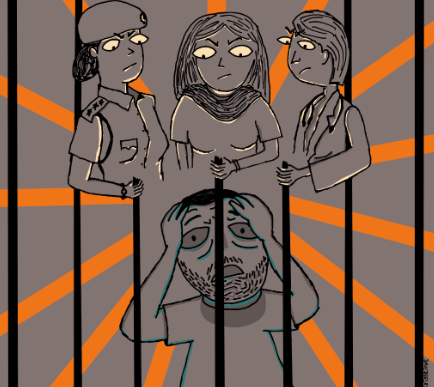
Credits: ONMANORAMA
In a country where the “motherhood penalty” leads to young mums quitting jobs in droves, one working mother decided to take her three-year-old son with her to a public function to which she had been invited.
The valedictory function of a film festival was held on a Sunday, October 30. In the video, Divya Iyer, the district collector of Pathanamthitta district, Kerala can be seen attending with her son.
Deputy speaker of the state assembly, Chittayam Gopakumar posted a video on his Facebook page. That video has since been deleted but not before scores of (mostly) men huffed and puffed about ‘propriety’. Lyricist Rajeev Alunkal accused Iyer of ‘trivializing’ the function.
Divya Iyer retorted: “I’m a 24×7 mum and a 24×7 district collector….We women take on 24×7 roles, where we cannot afford to do shifts.”
What if it was a man who took his son along to a function? Would he have been accused of ‘trivializing’ the event, or would he have been hailed as a super-dad?
Women are expected to silently and uncomplainingly juggle several roles – homemaker, wife, mother, employee – spending eight times more on care work compared to men, finds an analysis of time-use data by economist Mitali Nikore.
In fact, having a young child at home “depresses mothers’ employment” finds a March 2017 World Bank policy paper written by Maitreyi Bordia Das and Ieva Zumbyte.
Divya Iyer did what any young mother should do. Required to be present at a function on a holiday, she took her son along. We need to see more of this, not less.
What do you think? Do we need to normalize taking our kids to work? Write to me at: namita.bhandare@hindustantimes.com.
THE BIG STORY: The two-finger test is banned, again. Why we need to do more for rape survivors.
The test is as crude as it sounds. Its assumption: If during a medical examination following a rape, two fingers can fit inside a vagina, it means that a woman is sexually active and, therefore, could not have been raped.
Questioning the scientific validity of the test and challenging the Victorian notion of ‘purity’ that a sexually active woman cannot be raped, a two-judge bench of justices Dhananjay Chandrachud and Hima Kohli of the Supreme Court on Monday called the test ‘patriarchal and sexist’ and said those who conduct it are “guilty of misconduct” and would be liable to punitive action.

Banned in the past too
The two-finger test has been banned earlier too through judgments starting in 2013 (Lillu v State of Haryana).
The amendment to the criminal law in 2013 following the December 2012 gang-rape of a medical student in Delhi makes it clear that previous sexual experience is not relevant to the issue of consent.
In 2014, the health ministry issued guidelines stating that the two-finger test must not be conducted for establishing rape or sexual violence.
But in 2019 when the medical curriculum underwent significant changes, it continued to teach students how to examine “virginity testing”.
So, why does it continue?
Calling the two-finger test the “biggest fraud on women in the history of forensic science” Pratiksha Baxi, associate professor at the Centre for the Study of Law and Governance, Jawaharlal Nehru University said it “protects the interest of patriarchy”.
“There is no scientific basis for it and it is in fact an act of violence on women,” she said.
Courts continue to deal with entrenched stereotypes as far as rape survivors are concerned, agreed lawyer Madhu Mehra. “You can change the law, but the burden of translating this into a mindset change lies with the state and various institutions,” she said.
Judges too can stereotype rape survivors and pass judgment on the basis of how they believe women ought to behave. For instance, in July 2020, a Karnataka high court judge granted bail to a rape accused because the woman went to sleep after being raped. “That is not the way our women react after being ravished,” the judge noted.
[Read The courts’ misogynistic rules of rape survivors here]
What next?
The Supreme Court has directed the central and state governments to ensure its guidelines are circulated to hospitals. It wants workshops so that health providers are aware of procedures to adopt while examining rape survivors. And it wants a review of the medical school curriculum
“More needs to be done to abolish the entire repertoire of unscientific medical procedures that continue to deny women who suffer sexual violence the right to dignity and privacy,” writes Sangeeta Rege, director, Centre for Enquiry into Health and Allied Themes.
Baxi welcomed the judgment but said you cannot have a piecemeal approach.
Even something as basic to women’s dignity – an extra set of clothes at the police station where she files her complaint and her clothes are collected for forensic analysis – is not available. “This is an act of stripping, sanctioned by the law,” Baxi said.

Credits: SRISHTI SHARMA/FEMINISM IN INDIA]
REST IN POWER

The death at the age of 89 of Ela Bhatt–Elaben to millions of her admirers–leaves a void in social activism. With her extraordinary ability to organise, the founder of SEWA was able to create a movement of 2.1 million self-employed women in 18 states, the largest such of informal women workers anywhere in the world. Over half a century, SEWA has built over four dozen institutions, including Sewa Bank that disburses microfinance loans to its members.
She herself said that her life’s work could be summarised in three simple words: Women, work, peace.
Also read tributes by Mirai Chatterjee, Devaki Jain and Renana Jhabvala.

IN NUMBERS
The disparity in pay gaps and breaks in career mean that women, when they retire from work, will have just 74% of the wealth accumulated by men. The world’s worst gender wealth gap is India with just 64%.
Source: WTW Global Gender Wealth Equity Report, 2022
WATCH: Can’t hide love
After keeping their relationship secret for years, Miss Argentina 2020 Mariana Varela and Miss Puerto Rico 2020 Fabiola Valentin finally came out on October 28 to announce their union on social media.
Watch here.

STORIES YOU MIGHT HAVE MISSED
The many interpretations of Pocso
Acts of mutual affection between an underage couple do not amount to sexual assault under the Pocso (Protection of Children Against Sexual Offences) Act, the Meghalaya high court has observed while quashing charges filed by the police against a teenage boy over his relationship with his girlfriend.
In Karnataka, the high court also quashed a Pocso case filed against a man for impregnating his minor wife, married to him in accordance with Muslim personal law.
But, in another ruling two days later, in the same court, a different judge ruled that the marriage of a Muslim minor girl, even if allowed under her religion’s personal law, is invalid as it violates Pocso provisions that set 18 as the legal age for consent for women. A case was registered against a man when it was discovered that his 17-year-old wife was pregnant.
UCC for Gujarat?
Ahead of the assembly elections in the state, the Gujarat cabinet has announced the setting up of a committee to study the modalities of implementing the Uniform Civil Code. With this, Gujarat becomes the third BJP-ruled state after Himachal Pradesh and Uttarakhand to announce such a move.
FIELD NOTES: The great break-up
Women want more from work and are leaving companies in unprecedented numbers to get it, finds a new McKinsey report. Described as the largest study of women in corporate America involving 333 organisations and surveying over 40,000 employees, Women in the Workplace 2022 finds women leaders switching jobs at higher rates than men in leadership, and companies struggling to hold onto the relatively few women leaders they have.
The reasons are varied. Women are as ambitious as men but “face headwinds that signal it will be harder to advance. They’re more likely to experience belittling micro-agressions, such as having their judgment questioned or being mistaken for someone more junior,” states the report.
Read the report here.
AROUND THE WORLD
In Japan, a country that does not allow same-sex marriage, Tokyo will begin issuing ‘certificates’ to same-sex couples recognising their union, reports Bloomberg. Over 200 smaller towns, accounting for one-fifth of Japan’s municipalities, now recognise same-sex unions that are not as yet legally binding but, nevertheless, allow partners benefits such as applying for public housing and accessing medical data.
In China, women must uphold “family values” in the amended Women’s Rights and Interests Protection Law passed on Sunday, reports Fortune. “Women should respect and obey national laws, respect social morals, professional ethics and family values,” states the amendment. During a key leadership reshuffle last month, women were excluded for the first time in a quarter century from the country’s top-decision making Politburo.
BEFORE I GO: Even as a group of women leaders, Nobel Prize laureates, governments and activists from around the world call on the United Nations to remove Iran from its Commission on the Status of Women, let’s not forget the brave women of Afghanistan who continue to fight for the right to work and go to school. Human Rights Watch has a report on how three Afghan women detained for protesting Taliban abuses were subject to torture and other mistreatment in custody.
| Were you forwarded this email? Did you stumble upon it online? Sign up here. |
| That’s it for this week. Do you have a tip or information on gender-related developments that you’d like to share? Write to me at: namita.bhandare@gmail.com. |